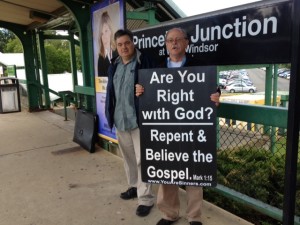 WEST WINDSOR, NJ. — An evangelist in New Jersey plans to appeal after a municipal judge found him guilty of defiant trespassing this week for preaching the Gospel at a public train station.
WEST WINDSOR, NJ. — An evangelist in New Jersey plans to appeal after a municipal judge found him guilty of defiant trespassing this week for preaching the Gospel at a public train station.
As previously reported, Robert Parker has been preaching at the Princeton Junction train station in West Windsor for the past five years, which is a part of the New Jersey Transit system, a provider of public transportation. Last summer, after he and fellow evangelist Don Karns had finished preaching and witnessing to those waiting for trains, and were leaving, the men were approached by Sergeant Kathleen Shanahan and Officer Sandy Crowe.
Parker and Karns told Christian News Network that Shanahan, who demanded identification, was “extremely hostile,” and claimed that the evangelists had violated the law for speaking at the train station without a permit. The men attempted to record the encounter with their cell phones, but were ordered to turn them off.
“[Sergeant Shanahan] started repeatedly saying, ‘Put the phone down; put the phone down,’” Karns recounted. “You guys are big guys, and I’m just a little officer. You know how scary it is when you have a camera in your hand. How do I know you’re not terrorists? I have no way of knowing that’s not a bomb.”
While Parker provided identification to the officers, Karns asserted his right to privacy. The men were then taken into custody and transported to be booked and charged. After spending three hours in jail, they were leveled with three offenses: defiant trespass, and two counts of obstruction for recording with a cell phone and declining to provide identification.
Parker and Karns later stood trial in municipal court before Judge Kenneth W. Lozier, who took over a year to reach a decision in the matter. Parker told Christian News Network that much of the testimony of the police officers was made to portray them as possible terrorists.
“[Shanahan testified] that we had backpacks, that we were heavily dressed on a very hot day in May, and that our pockets were bulging,” he explained. “She was intimidated by our size and she just took a terrorist class, and so to her, we looked like how a person would look as a terrorist.”
Parker explained that the men were wearing jackets because they had arrived at 5:30 a.m.—when passengers also begin arriving—and it was only 40 degrees out at that time.
He said that he was also disturbed when the prosecution used another officer, Officer Jackson, to testify that he had told Parker in 2009 that a permit was required. But Parker had video footage of the incident, which he said is “ambiguous at best” as the officer was willing to work out the situation to allow them to preach.
“It was very troubling to go and hear all that,” he stated. “I’ve been there for five years preaching the Gospel. Many police officers that came there gave me a thumbs up, saying, ‘You’re not doing anything [wrong]. You’re not bothering anybody. Just make sure you stay behind the yellow line.’ … A lot of respect from police until this day.”
Parker and Karns had to make several trips to court for the trial, including earlier this month, when they learned that the judge had forgotten about their case and had to reschedule his decision. While Karns was found not guilty of all charges, Lozier declared Parker guilty of defiant trespass for preaching at the public train station due to Jackson’s assertions.
But what shocked Parker the most is when Lozier began to pronounce sentencing.
“He was going to sentence me and put me in jail,” Parker explained. “But the prosecutor jumped up and said, ‘Listen, I don’t want to see him go to jail. Just make him pay a fine.'”
“I’m thinking, ‘I could have gone to jail today for … exercising my First Amendment right to free speech,” he continued. “I was like, ‘What has this country come to?'”
Parker states that he plans to appeal the ruling, which could take several months. He says that he has a heart for every passenger at the Princeton Junction train station and would like to regain his right to return and share the Gospel.
“I love each and every one of those commuters,” Parker said. “I have really good relationships with some of the people that go there. … We go there because we love them and we want to see them in Heaven. And so we preach the Gospel to them; we have no other motive.”
Become a Christian News Network Supporter...


